Ithaki is a large restaurant, with a lengthy bar to the left, elegantly decorated, with a wine room to the rear of the restaurant.
I liked the detailed octopus mural on one of the back walls.
There were about 12 of us at the Domaine Costa Lazaridi wine dinner, nearly all of who spoke Greek. It was a friendly and welcoming group.
Pictured here is Yianni Mirisis (on the left), the founder of Yiannis Distributing (who is importing the wines), and Petros Markopoulos (on the right), the owner/chef of Ithaki.
The special guest at the dinner was Gerasimos Lazaridis, the Managing Director at Domaine Costa Lazaridi, a family winery located in Drama, in northeastern Greece. It was his father, Costa Lazaridis, who founded the winery, first planting vineyards in 1979, the first modern linear vineyard in the area. Costa had been previously involved in the marble business, but became interested in wine during his frequent visits to Germany. In 1986, Costa built the first modern winery in Drama.
Drama has a lengthy history of wine making, extending back about 6,000 years, and it was also an important center of Dionysian worship, the god of wine-making and fertility, religious ecstasy and theater. Its modern history of wine-making though is such shorter and smaller. At this time, there are about ten wineries in the region of Drama, and international grapes dominate, although there are plantings of indigenous Greek grapes as well. Drama is sometimes called the "Bordeaux of Greece."
When Costa planted his first vineyards, about 21 acres, the grapes included Cabernet Sauvignon, Sauvignon Blanc and Assyrtiko. This was risky as those grapes hadn't been planted before in this region, but they thrived and the experiment worked well. International grapes were chosen in large part for commercial reasons, to offer consumers grapes of which they were familiar, and which many people, worldwide, enjoying drinking.
Today, they own about 300 hectares of vineyards, in four different regions (Adriani, Kali Vrisi, Katafito, and Platania), growing about 2/3 international grapes and 1/3 indigenous Greek grapes. Grapes includes Cabernet Sauvignon, Chardonnay, Syrah, Pinot Noir, Merlot, Sauvignon Blanc, Cabernet Franc, Viognier, Grenache Rouge, Malagouzia, Vidiano, Agiorgitiko, and Assyrtiko. They also own a distillery in Adriani and a vinegar factory in Kali Vrisi.
Gerasimos stated that "wine is made in the vineyard," and with about 200 employees, 150 of them are employed in the vineyard. Climate change has affected their vineyards, so they have started planting at higher altitudes to try to avoid the problems of climate change. They currently have three different labels: Amethystos, Chateau Julia, and Domaine Costa Lazaridi.
In 1995, after years of petitions from Costa, Drama finally was awarded a Protected Geographical Indication (PGI). 19 international and indigenous Greek grapes are now approved for this PGI.
We began the evening with the 2021 Chateau Julia Assyrtiko ($22), and I'll note that Julia is the name of Gerasimos' mother. The four wines in the Chateau Julia line are single-varietal wines, both international and indigenous. These are intended to be wines reflective of terroir. Assyrtiko is best known as a white grape on Santorini, and in Drama, the grape takes on a slightly different flavor profile, generally being more fruity and aromatic.
About 80% of this wine was aged for six months in stainless steel while 20% was aged in barrique. On the palate, the wine had a richer mouthfeel and crisp acidity, with a pleasing blend of flavors, including citrus and lemon, a touch of minerality and a hint of smoke. A satisfying and moderately lengthy finish. This would be an excellent wine paired with seafood, although it would also be a fine summer wine on its own.
We began our dinner with a trio of seafood appetizers, including Marinated Sardines. A delightful taste of the sea, with a delicious briny aspect, enhanced by the clean taste of the olive oil.
Lauraki Tartare, made with Branzino, was also fresh and tasty, with bright, clean flavors.
The Tuna Crudo was another delicious dish, with silky tender tuna, enhanced with some citrus. All three dishes paired very well with the Assyrtiko.
Our next wine was the 2022 Amethystos Blanc, which had been first released in 1992 and was now their most exported wine. The word "amethystos" roughly translates as "a person who cannot get drunk" and there's an ancient Greek myth, with a couple different versions, about it. There was once a beautiful maiden named Amethystos and she came to the attention of Dionysus. She rebuffed his advances, and prayed to the other gods for help. The gods transformed her into a white stone and then Dionysus, saddened at the loss, either poured wine upon the stone, or his tears (also made of wine) fell upon the stone. That turned the stone purple in color.
To both the ancient Greeks and Romans, they believed that the amethyst stone could protect you from becoming intoxicated. So, they wore or carried amethysts with them, and even crafted drinking vessels from it, believing such cups would prevent them from getting drunk. If only that were true!
With this wine, we had a dish of Scallops, with a parsnip puree, mushrooms, and asparagus. The Scallops were excellent, tender and sweet, and cooked perfectly. The mushrooms added a nice earthy touch and the parsnip puree countered the sweetness of the scallops with a mild bitter note. And the wine was again a good pairing with this dish.
The Rosé was paired with a dish of Kiofte (Beef Kebob), with a confit tomato, onion, yogurt, and paprika. The kebobs had a nice crisp exterior and the interior was moist and tender, meaty and nicely spiced. The Rosé worked nicely with the meat, and it would also do well with a grilled burger.
The 2022 Chateau Julia Chardonnay, which spent three months in stainless steel, was crisp and fruity, with delicious and bright flavors of apple, lemon and tropical fruit (especially pineapple). It possessed a little richness in the mouthfeel and had a lengthy, satisfying finish. Another wine that would be excellent on its own but paired well with food as well.
A dish of Halibut was accompanied by asparagus, pea risotto, and Harissa sauce. The halibut was moist, tender and flaky, cooked just right, and the spicy Harissa was a nice accompaniment. The pea risotto was also very good.
A palate cleanser, a Lemon Granita, was next brought out.
Our final savory dish was Short Rib, with eggplant and roasted potatoes. The short rib was extremely tender, easily falling apart with your fork, and was delicious, with a slightly sweet glaze atop it. The potatoes were quite good as well.
With this meat, we enjoyed the Amethystos Red ($28), a blend of 70% Cabernet Sauvignon, 20% Merlot, and 10% Agiorgitiko. It was suggested that decanting this wine would be a good option but not essential. It spent about 12 months in oak, 25-30% new oak. It has a very dark red color, with a nose of black fruit, spice and a hint to tobacco. On the palate, it has moderate tannins, ripe black fruit flavors, a spicy backbone, and a hint of tobacco. A lingering and pleasing finish. And a great pairing with the short rib.
First, I was impressed with the cuisine at Ithaki, each dish well composed, cooked perfectly, and full of flavor. I certainly want to return here to check out more of their menu. Second, the wines of Domaine Costa Lazaridi were also impressive, obviously well made and excellent examples of the grapes of which they're made. As I've often said, I prefer Greek wines made from indigenous grapes, such as their Chateau Julia Assyrtiko, but there's no question that their wines, made from international grapes, are impressive in their own right. Gerasimos Lazaridis was also a fine ambassador for his family's winery, and was personable and knowledgeable. For dessert, we received a plate of Greek cheeses (such as Kefalograviera and Kasseri) with accompaniments. Cheese plates always please me, and this wasn't an exception. I especially enjoyed spreading some fig jam on the various cheese.
Our final drink of the evening was the Methexis Cigar 10 Year Old, a brandy made from 100% Sauvignon Blanc and aged for 10 years in the barrel. The term "Methexis" refers to a "state of euphoria/happiness after drinking." It is also called "cigar" as it's said to be good to drink wile you're smoking cigars. With a 43% ABV, this brandy had a fine, golden color and an alluring, fruity aroma. On the palate, it was strong, but not overpowering, with a complex and intriguing melange of flavors, including citrus and dried fruits, vanilla and spice. Definitely something to slowly savor over the course of time, reveling in the different flavors you experience with each sip. What a fine way to end this excellent wine dinner.
Once again, I have to ask, why aren't you drinking more Greek wines?

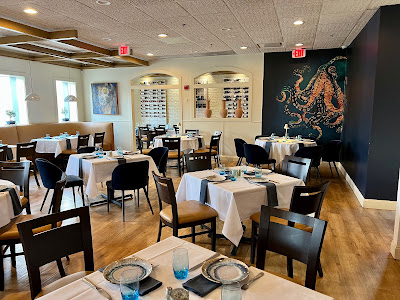

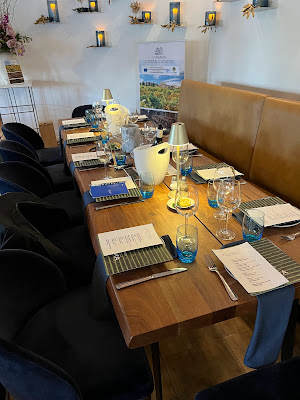
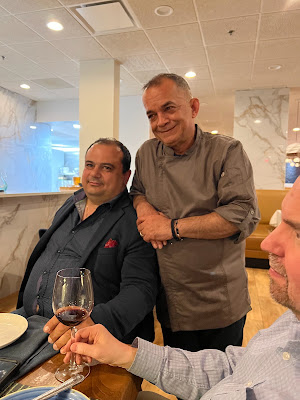


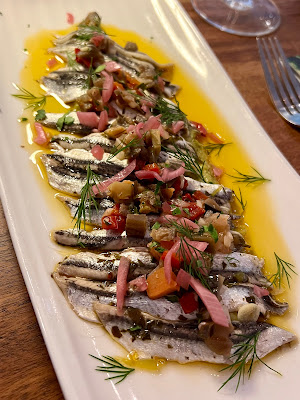


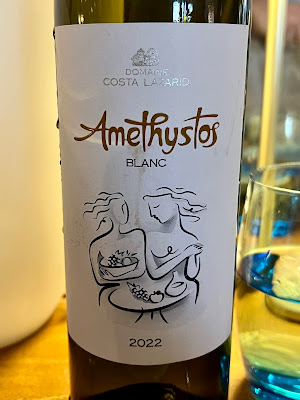
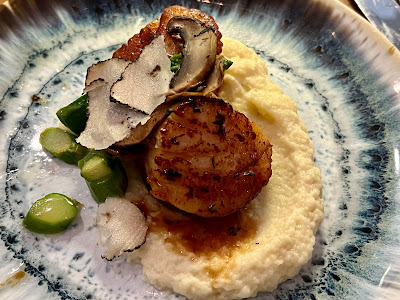







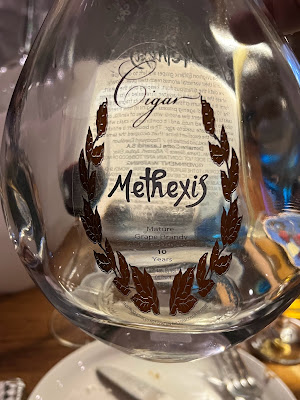

No comments:
Post a Comment